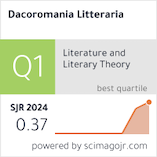WITHOUT TIME OR PLACE.
INNOVATING THEORY DURING THE COMMUNISM
(Abstract)
Starting from a volume of theoretical poetics published in Romania in 1981 (Ioana Em. Petrescu, Configuraţii [Configurations], Cluj-Napoca: Dacia) that we are currently re-editing, we aim at considering the way in which a Romanian literary theorist could, at the time, innovate, discuss, and – eventually – find and articulate their personal and highly iconoclastic voice within a field which was a priori regarded as being remote or even prohibited. Given the present access to the personal library and manuscripts of the author in question, we hope to be able to recreate some reading patterns (of theoretical texts), as well as some ways of putting into practice new ideas. Ioana Em. Petrescu’s volume offered a reading key to the least polemic of the great remaining structuralists, turning as an alternative to the Gestalt theory of the interwar period, in order to set up a new vision of the poetical language, where one can find ideas and inspirational sources from different ages and schools of thought. The close-readings (mainly of Romanian canonical and even school literary texts) also constitute a voluntary “poor” approach of literary theory. Is that a contextual solution of the ivory tower? An indifference to the whims of fashion and to Western patterns? A form of extreme freedom from the part of a theoretician?
Keywords: Ioana Em. Petrescu, intellectual history, reading practices, communism, Gestalt theory.


